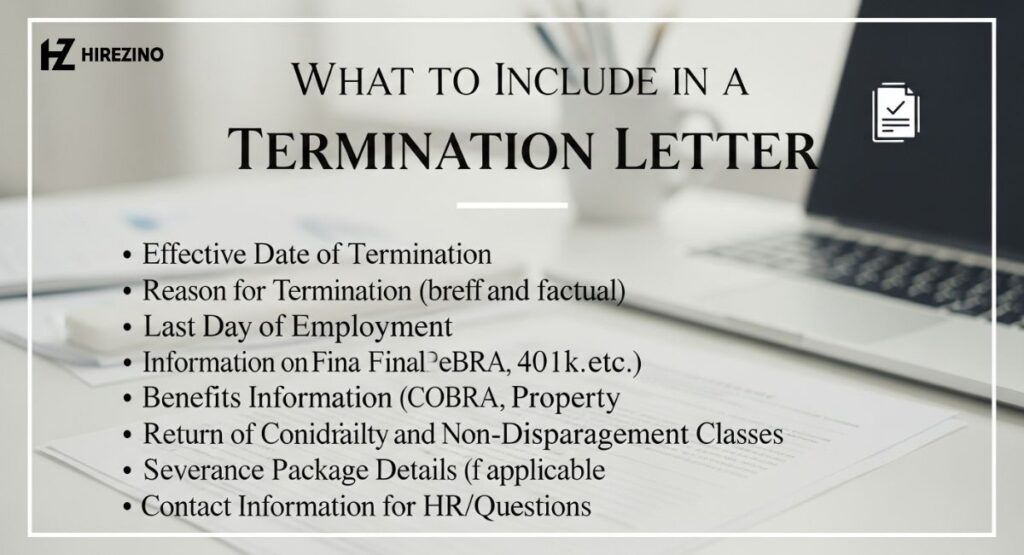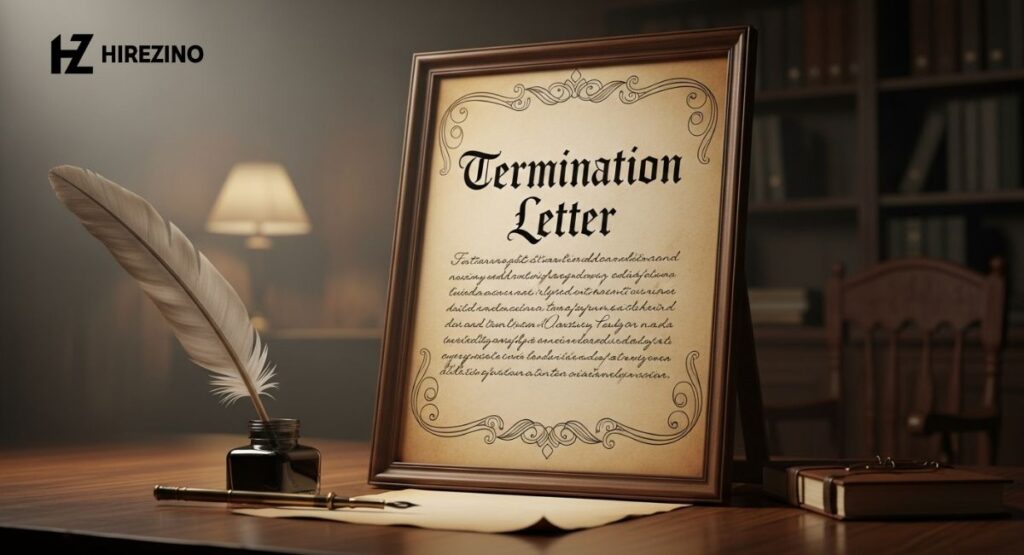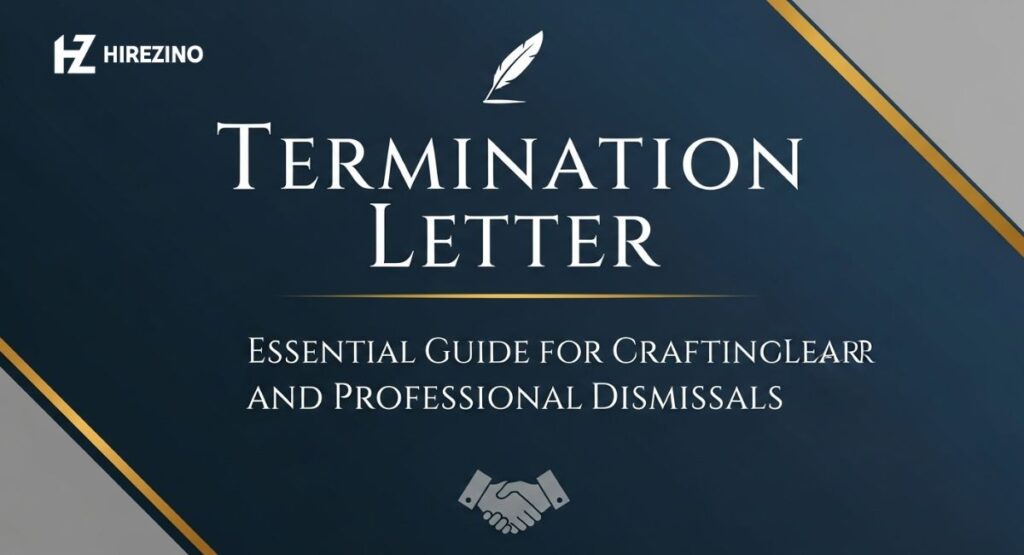The termination letter is a serious official document that is employed to inform an employee about the termination of his or her relationship with his or her employer. This letter is used to ensure that all employees abide by the message and there is no confusion when firing an employee regardless of whether the termination is because of poor performance or other reasons, or the company is restructuring. Not only does it provide a record of the termination decision but also is used to provide the necessary information such as the effective date of termination, details of the final paycheck, and the continuation of employee benefits such as COBRA benefits or severance pay.
A good termination letter also helps to safeguard both the employer and the employee since it indicates the legal requirements and the process of transitioning the employee. It also assists in the preservation of the professional relations between the employee and minimizes the possibility of misunderstanding or conflicts. Through HR best practices, companies can approach the delicate job separation process with respect, clarity and efficiency that would enable the employment relationship to be ended well.
What is a Termination Letter?
A termination letter is an official document which informs an employee that his or her employment is over. It includes the cause of termination, the termination day and any additional terminations such as the severance compensation or benefits. This letter will clarify the decision of the termination and can be taken as a written evidence of the employment termination.
Termination letter is another term that is usually obligatory within the context of the HR. It is not merely a ceremony, but a very important part of employee relations process. It guarantees that the law is not violated and the employer is not subject to possible controversy or claims of wrongful termination. In the absence of this document, the employer may have problems in justifying his or her actions.
Why Are Termination Letters Important?
The termination letters are important to both the employer and the employee. First, they ensure legal protection. The letter also contributes to protecting the employer against the liability of wrongful dismissal due to a well-written statement of the causes of dismissal. In the absence of this documentation, there may be a threat of legal action because of lack of clarity during communication.
To the employees it brings about clarity and transparency. It is a legal announcement of their separation of jobs. This paper assists employees in knowing why they have been dismissed, and give information on the benefits that the employees have such as the COBRA benefits or severance payments. In addition, it defines the procedure to be used in the process of repatriation of company property and other required final tasks so that both parties can get a smooth transition.
What to Include in a Termination Letter

A termination letter ought to be to the point and in a professional manner. It must contain a number of key points. To begin with, the letter must mention the name and position of the employee. This will make sure that there is no misunderstanding of the recipient of the letter.
The effective date of termination should also be mentioned in the letter. This is very important, because it is the formal termination of employment. Also, the cause of termination must be given, which may be performance problems, misconduct, and termination as a cause. Where relevant, the letter must specify the severance pay, final remuneration and any benefit continuation of the employee such as a healthcare, in some instances.
Types of Termination Letters
Depending on the circumstance, termination letters come in a number of forms. Termination letters are voluntary, and issued in case of resignation of an employee. Such a letter is generally not very formal and accepts the resignation of the employee and mentions the date of final work.
The involuntary termination letters are applied in situations when an employee is fired on the basis of his or her performance, misconduct or violation of the company policy. The reason why the termination is being declared should be clearly mentioned in the letter; it may be based on termination due to cause, or termination based on a failure to perform.A different category is that of layoff notices. The cause of termination of the job is elaborated in these letters and various reasons are quoted most often monetary or restructuring in the firm.
Employee Termination Letter Templates
The HR professionals can use employee termination letter templates and make the termination of employees easier. These templates contribute to the fact that all the required information is included in a regular and professional way. There are templates that can be tailored to suit different scenarios, like the performance termination, misconduct of the employee or the simple voluntary resignation.
It is also possible to have a template of a termination letter to avoid errors. It also makes the letter conform to the HR policies and adhere to labor laws. This will minimize the chances of omitting any important details to be kept and will make sure the procedure follows the best HR practices.
How to Write a Termination Letter

Clarity begins writing a termination letter. Start with stating the effective date of termination. The decision to terminate should be stated at the beginning, which means that the employee is aware of what is going on.Then, provide a reason why it was terminated. In case it is because of performance problems, make sure what performance expectations were not achieved. In case the employee is being dismissed as a result of their misconduct, describe the policy infraction that the company is committing.
Lastly, the letter must incorporate any other information like returning of the company property, where the final payment would be made and the requirements on the severance payment. One should consider providing information on the continuation of employee benefits (e.g. the COBRA benefits) and information on how to contact those in case of future questions.
Best Practices for Writing a Termination Letter
The termination letter that is being written should have a professional tone. One should be respectful and understandable. Although the employee may have been dismissed as a result of misconduct, then use mild language. Rather concentrate on facts and be impartial.The other best practice is making sure that the letter is in compliance with all the laws that regulate employment. Test the HR policies of the company to make sure that the letter is in accordance with the standard termination procedures.
Make sure everything is right, such as the amount of paycheck at the end and the severance package. Also, you should never leave home without a copy of the termination letter. This is termination documentation that can be required in future to confirm the departure of the employee or it can be required to address any legal conflict.
Employee Termination Letter Examples
Subject: Termination Letter (Voluntary Resignation)
Dear [Employee Name],
This is to inform you that you have resigned as an employee through date [date]. On day [last working day] you are effectively terminated. We desire that your future lives will be fruitful.
Sincerely,
[Your Name]
[Company Name]
Factum 2: Termination due to Performance.
Dear [Employee Name],
It is very unfortunate to inform you that we are ending your employment with [Company Name] and this will be on [date] and the reason is due to continuous performance problems. You will be provided with your final salary along with the benefits that you have acquired.
Sincerely,
[Your Name]
[Company Name]
The Role of Termination Letters in HR
The dismissal letters are important to the HR structure. They assist in making sure that the process of departure of the employees is done in a smooth and professional manner. With the letter documented, the HR departments will be able to be consistent and fair in the ways of communicating terminations.
In addition, these letters form an important section of the HR documentation process. They provide a written documentation of the termination process of the employees and help the company to defend itself against any future allegations regarding the dismissal of the employee or the wrongful termination.
Conclusion
To conclude, a termination letter is an important one, which guarantees the clarity and professionalism of the process of breaking the employment relationship. It could be because of performance related matters, misconduct on the part of the employee or an individual resignation; either way, the termination letter will ensure that the employer is covered by law and the employee is informed. Adhering to the HR best practices, such as mandatory information, such as the severance payment, final compensation, and the continuation of the employee benefits, you will be able to manage the process of dealing with it and within the limits of the labor regulations.
It is important to remember that the termination letter is not a mere formality as it is a document of the employee leaving and the guardian of both parties. The protocol agreed upon by the termination and the writing of an efficient and well-written letter containing respect toward an employee may serve as a way of preserving the relations and making the process of termination as smooth as possible. It is with these tips and insights that you can safely go through the employee termination process, and prepare termination documentation that will prevail even in unfriendly circumstances.
FaQs
How to write a simple termination letter?
State the employee’s name, reason for termination, effective date, and any final pay or benefits clearly and professionally.
What is a termination letter?
A termination letter is a formal document notifying an employee of the end of their employment relationship.
Does a termination letter mean you were fired?
Yes, it usually indicates an involuntary employment dismissal, though it can also document layoffs or termination for cause.
Can I get a termination letter if I quit?
Typically no; if you resign, you receive an acknowledgment, not a termination letter.
What is better, resignation or termination?
Resignation is generally better for your record, as termination can affect future job opportunities.
What are common reasons for termination?
Common reasons include performance issues, employee misconduct, layoffs, or violation of company policy.
Is termination the same as fired?
Yes, being fired is a type of termination for cause, but termination can also include layoffs or mutual agreements.

